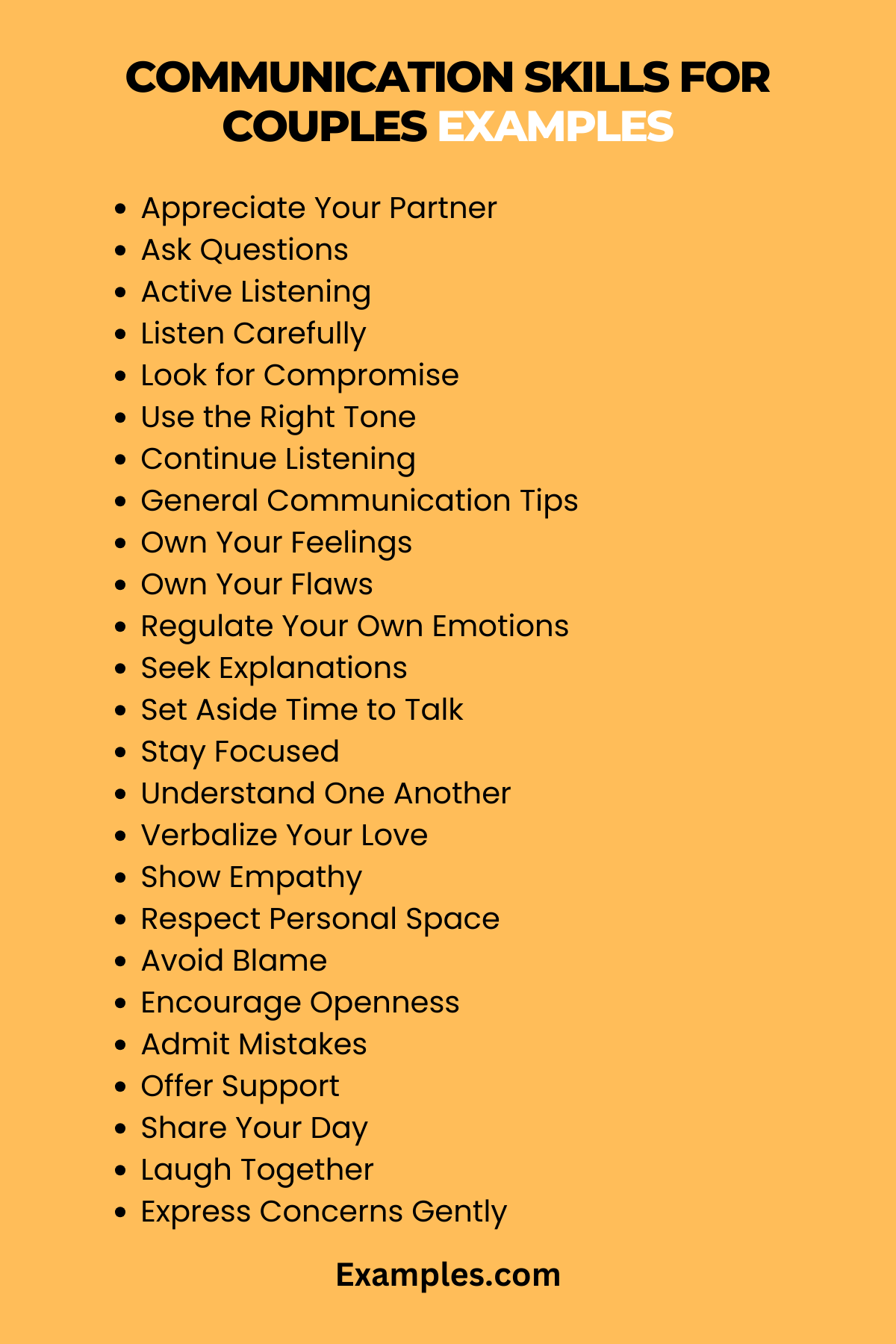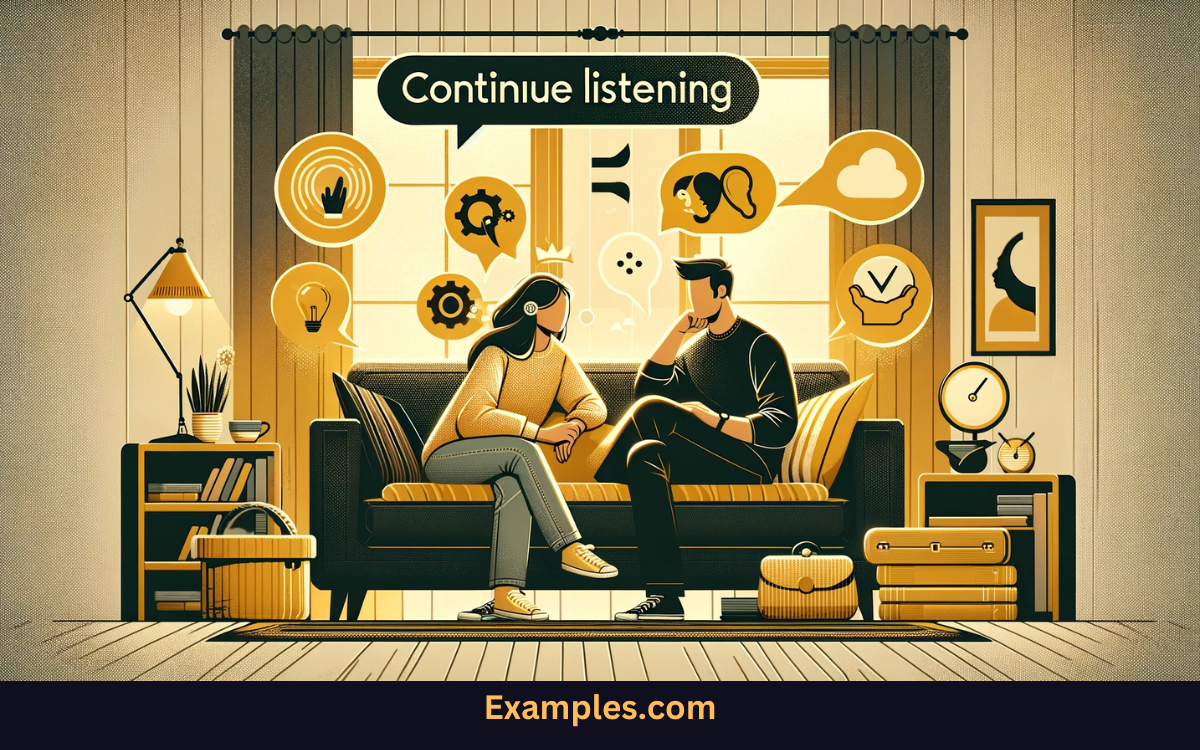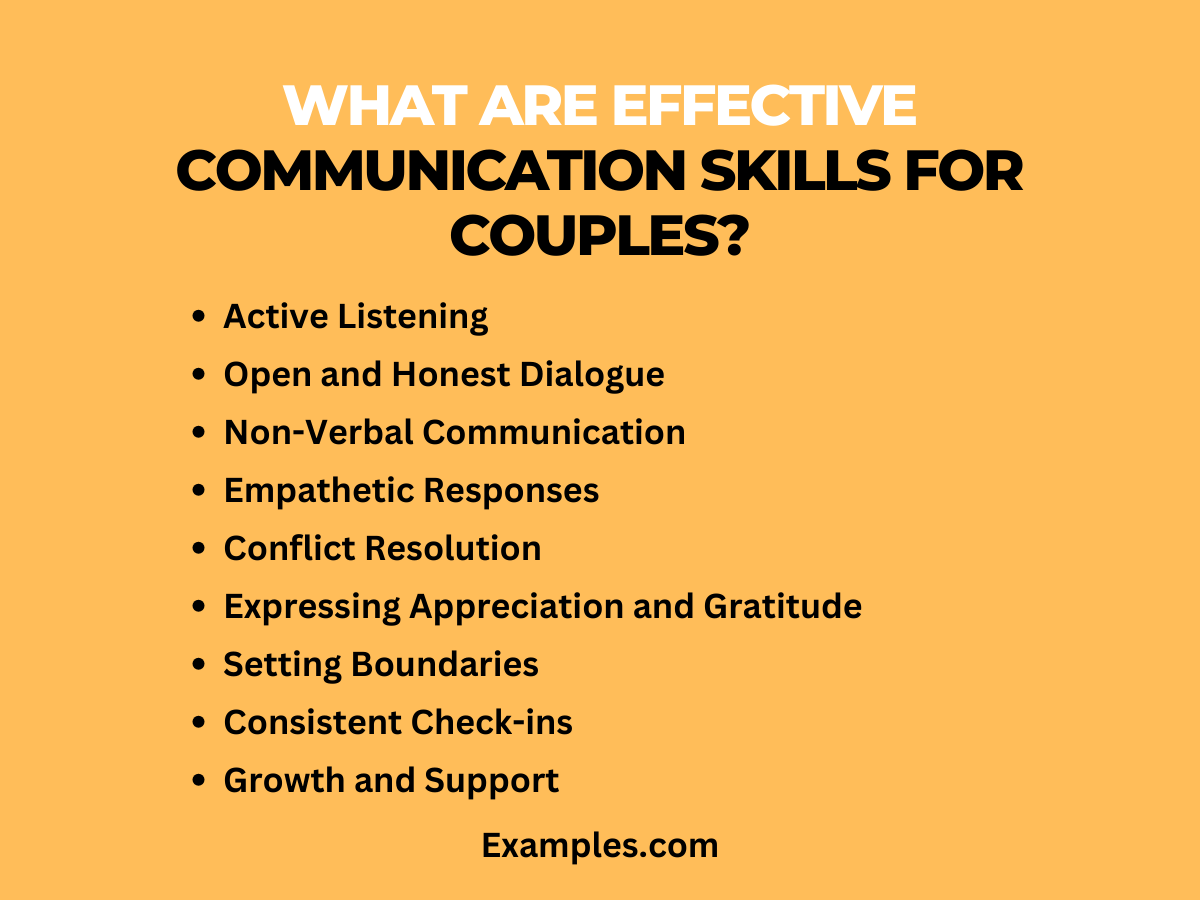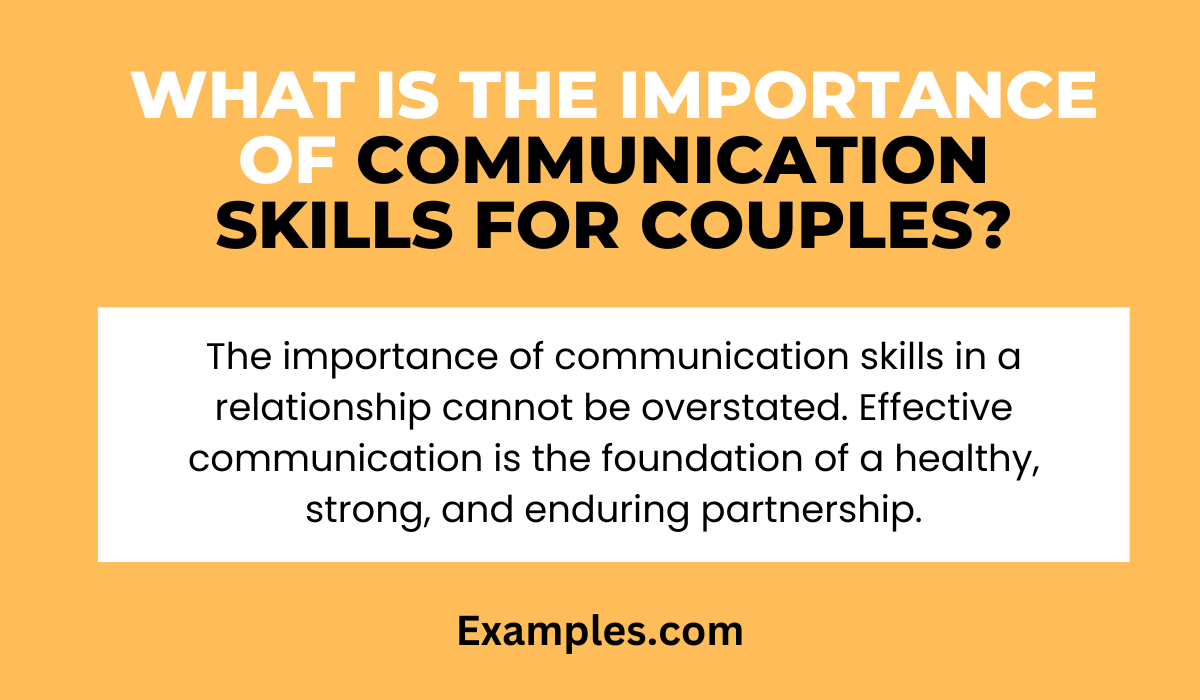29+ Communication Skills for Couples Examples
Effective communication is the cornerstone of any strong relationship. In this guide, we delve into the essential communication skills for couples, offering practical advice to enhance mutual understanding and foster deeper connections. Through illustrative communication examples, learn how to navigate conversations with empathy, patience, and clarity. Whether it’s resolving conflicts or sharing joys, these skills are key to maintaining a healthy, loving, and supportive partnership. Embrace these strategies to strengthen your bond and grow together as a couple in your journey of relationship building.
30 Communication Skills for Couples Examples
Effective communication is vital for maintaining a healthy and lasting relationship. This collection of 30 examples demonstrates practical ways couples can enhance their communication skills. Each example showcases strategies for better understanding, empathy, and connection, highlighting the importance of active listening, emotional regulation, and mutual respect in relationships.

- Appreciate Your Partner: “I really appreciate how you took care of me when I was sick. It meant a lot to me.”Regularly express gratitude for the little things your partner does.
- Ask Questions: “What made you feel that way?”Show interest in your partner’s feelings and experiences by asking thoughtful questions.
- Active Listening: “I hear you saying that you need more support around the house. Let’s discuss how I can help.”Focus on understanding your partner’s perspective without immediately responding or judging.
- Listen Carefully: “So, what you’re saying is that you felt overlooked at the party last night?”Repeat back what your partner says to confirm understanding.
- Look for Compromise: “I know you prefer quiet evenings, and I enjoy socializing. Maybe we can have a balance of both.”Work together to find solutions that accommodate both partners’ needs.
- Use the Right Tone: “I want to talk about this calmly, without raising our voices.”Be mindful of how your tone can affect the way your message is received.
- Continue Listening: “Please go on, I want to understand your point of view completely.”Encourage your partner to share more, showing your genuine interest in their thoughts.

- General Communication Tips: “Let’s try to have regular check-ins to see how we’re both feeling.”Incorporate healthy communication habits into your daily routine.
- Own Your Feelings: “I felt hurt when that happened, but I understand it wasn’t your intention.”Take responsibility for your emotions and express them constructively.
- Own Your Flaws: “I know I can be stubborn sometimes, and I’m working on it.”Acknowledge your imperfections and commit to personal growth.
- Regulate Your Own Emotions: “I’m feeling a bit heated, so I might need a moment to cool down before we continue.”Be aware of your emotional state and take time to calm down if needed.
- Seek Explanations: “Can you help me understand why you reacted that way?”Ask for clarification to avoid misunderstandings.
- Set Aside Time to Talk: “Let’s set aside some time this evening to talk about our vacation plans.”Regularly schedule uninterrupted time to discuss important topics.
- Stay Focused: “Let’s stick to discussing this specific issue instead of bringing up past arguments.”Stay on topic to resolve current issues effectively.
- Understand One Another: “I’m trying to understand your perspective. Can you explain a bit more?”Make a conscious effort to understand your partner’s point of view.
- Verbalize Your Love: “I love you, even when we disagree.”Regularly express your love and affection verbally.
- Show Empathy: “I can see why you felt upset about that situation.”Validate your partner’s feelings by showing empathy.

- Respect Personal Space: “I understand you need some alone time right now.”Honor your partner’s need for personal space and time.
- Avoid Blame: “Let’s focus on the issue, not on blaming each other.”Approach problems from a problem-solving perspective, rather than blaming.
- Encourage Openness: “I want you to feel safe sharing your feelings with me.”Create a safe environment for open and honest sharing.
- Admit Mistakes: “I was wrong to say that, and I apologize.”Acknowledge when you are wrong and offer sincere apologies.
- Offer Support: “I’m here for you, no matter what you need.”Be a pillar of support for your partner during challenging times.
- Share Your Day: “Let me tell you about this interesting thing that happened today.”Share details about your day to foster closeness and connection.
- Laugh Together: “Remember that funny incident from our trip? Let’s relive that moment.”Use humor to lighten the mood and bond.
- Plan Together: “What do you think about planning a trip this summer?”Involve your partner in making plans and decisions.
- Express Concerns Gently: “I’ve been a bit worried about how much you’re working lately.”Share your concerns in a gentle and caring manner.
- Celebrate Achievements: “Congratulations on your promotion, I’m so proud of you!”Celebrate your partner’s achievements and milestones.

- Discuss Future Goals: “Where do you see us five years from now?”Talk about future goals and aspirations to align your visions.
- Show Appreciation in Actions: “I made your favorite dinner tonight, just because.”Actions often speak louder than words; show appreciation through gestures.
- Resolve Conflicts Peacefully: “Let’s find a solution that works for both of us.”Approach conflicts with the aim of finding peaceful resolutions.
What are Effective Communication Skills for Couples?
Effective communication skills for couples are essential tools that help partners understand each other better, resolve conflicts, and build a stronger, more empathetic relationship. These skills go beyond just talking and listening; they involve a deeper level of interaction that fosters mutual respect, trust, and understanding.

Here’s a comprehensive guide on various aspects of effective communication in relationships.
Active Listening
- Undivided Attention: Give your partner your full attention, without distractions, to show that you value their words.
- Reflect and Clarify: Reflect on what is said and ask clarifying questions to ensure you understand their perspective.
Open and Honest Dialogue
- Transparency: Be open and honest in your communication. Share your thoughts and feelings truthfully.
- Avoid Assumptions: Do not make assumptions about your partner’s feelings or intentions. Instead, ask them to share.
Non-Verbal Communication
- Body Language: Pay attention to non-verbal cues like eye contact, facial expressions, and posture.
- Affectionate Gestures: Use physical touch, like holding hands or hugging, to convey love and understanding.
Empathetic Responses
- Empathy: Try to understand your partner’s viewpoint, even if it differs from your own.
- Validate Feelings: Acknowledge and validate your partner’s feelings, showing that you respect their emotions.
Conflict Resolution
- Calm Approach: Address conflicts calmly and constructively, avoiding blame and criticism.
- Find Common Ground: Work towards a solution that respects both partners’ needs and feelings.
Expressing Appreciation and Gratitude
- Regular Appreciation: Express gratitude and appreciation for your partner regularly.
- Recognize Efforts: Acknowledge the efforts your partner makes in the relationship.
Setting Boundaries
- Healthy Boundaries: Discuss and set healthy boundaries that are respected by both partners.
- Respect Limits: Understand and respect each other’s personal space and limits.
Consistent Check-ins
- Regular Communication: Have regular conversations about your relationship, including any concerns or changes.
- Emotional Check-ins: Regularly assess each other’s emotional well-being and offer support.
Growth and Support
- Encourage Growth: Support each other’s personal growth and goals.
- Shared Experiences: Create shared experiences that strengthen your bond.
By mastering these effective communication skills, couples can create a more fulfilling and resilient relationship. It’s about creating an environment of mutual respect and understanding where both partners feel heard, valued, and loved.
What is the Importance of Communication Skills for Couples?
The importance of communication skills in a relationship cannot be overstated. Effective communication is the foundation of a healthy, strong, and enduring partnership. It is more than just exchanging information; it’s about understanding the emotions and intentions behind the words.

Here’s a closer look at why communication skills are crucial for couples.
Building Trust and Understanding
- Fostering Trust: Open and honest communication builds trust, an essential element of any relationship.
- Deepening Understanding: Regular communication helps partners understand each other’s needs, desires, and perspectives.
Resolving Conflicts Effectively
- Conflict Resolution: Strong communication skills are key to resolving disagreements in a healthy and constructive manner.
- Preventing Misunderstandings: Clear communication can prevent misunderstandings that often lead to conflicts.
Enhancing Emotional Connection
- Strengthening Bonds: Sharing thoughts and feelings openly strengthens the emotional bond between partners.
- Empathy and Compassion: Effective communication fosters empathy, allowing partners to understand and feel for each other deeply.
Facilitating Personal Growth and Support
- Encouraging Growth: Good communication encourages both individuals to grow without feeling insecure or misunderstood.
- Providing Support: It enables partners to provide support during challenging times, strengthening the relationship.
Promoting Mutual Respect
- Respectful Interactions: Respectful communication, even during disagreements, promotes a healthy relationship dynamic.
- Valuing Opinions: Acknowledging and considering each other’s opinions fosters mutual respect.
Sustaining Long-term Happiness
- Long-term Satisfaction: Couples who communicate effectively report higher levels of relationship satisfaction and happiness.
- Adaptability: Good communication skills help couples adapt to changes in life and relationships over time.
Contributing to a Healthy Family Environment
- Positive Family Dynamics: For couples with children, effective communication sets a positive example, creating a healthy family environment.
- Teamwork: It promotes teamwork in managing family issues and decision-making.
Building a Foundation for Future Challenges
- Preparing for Challenges: Strong communication prepares couples to face future challenges together.
- Maintaining Connection: It helps maintain a connection even during times of stress or external pressure.
Communication skills are the bedrock of a healthy and fulfilling relationship for couples. They enable partners to build trust, resolve conflicts, connect emotionally, support each other, and maintain a long-lasting, happy relationship. Cultivating these skills is an ongoing process that can significantly enhance the quality and resilience of the bond between partners.
How to Fix Communication in a Relationship for Couples?
Effective communication is vital in maintaining a healthy relationship. However, couples may often encounter communication breakdowns. Addressing these issues requires a thoughtful approach and a willingness to improve. Here’s a guide on how to fix communication in a relationship, focusing on rebuilding understanding and connection.
Recognize the Communication Issues
- Identify Problems: Acknowledge the specific areas where communication is lacking or ineffective.
- Mutual Acknowledgment: Both partners must recognize and agree that there is a communication problem that needs addressing.
Create a Safe Space for Dialogue
- Open Environment: Establish a calm and safe environment for discussions, free from distractions and interruptions.
- Non-judgmental Attitude: Encourage an atmosphere where both partners feel safe to express their thoughts and feelings without fear of judgment.
Practice Active Listening
- Attentive Listening: Listen attentively to your partner, showing genuine interest in what they are saying.
- Validate Feelings: Acknowledge your partner’s feelings and viewpoints, even if you disagree. This helps in building empathy and understanding.
Express Yourself Clearly and Honestly
- Clear Expression: Communicate your thoughts and feelings clearly and respectfully, avoiding vague statements.
- Honesty: Be honest but considerate in your communication. Honesty helps in building trust and transparency in the relationship.
Use ‘I’ Statements
- Avoid Blaming: Instead of using accusatory ‘you’ statements, use ‘I’ statements to express how you feel.
- Focus on Feelings: Talk about your feelings and experiences, rather than blaming the other person.
Learn to Handle Conflicts Constructively
- Healthy Conflict Resolution: Approach conflicts as a team. Focus on solving the issue rather than winning the argument.
- Compromise and Collaboration: Work towards solutions that satisfy both partners, showing willingness to compromise and collaborate.
Incorporate Regular Communication Routines
- Scheduled Conversations: Set aside regular times to check in with each other and talk about your relationship.
- Consistent Effort: Make consistent efforts to communicate, even when life gets busy.
Seek Professional Help if Needed
- Counseling: If communication issues are deep-rooted and challenging to overcome, consider seeking help from a relationship counselor or therapist.
- Workshops and Seminars: Attend workshops or seminars on communication skills for couples to gain additional insights and tools.
Practice Patience and Understanding
- Patience: Understand that fixing communication issues takes time and effort from both partners.
- Empathy: Try to see things from your partner’s perspective, fostering a deeper understanding and connection.
Repairing communication in a relationship is not an overnight fix but a journey of mutual effort and understanding. By employing these strategies, couples can strengthen their communication skills, leading to a healthier, more fulfilling partnership.
How to Use Communication Skills for Couples?
Effective communication is vital for maintaining a healthy and thriving relationship. For couples, mastering the art of communication can lead to a deeper understanding, greater intimacy, and long-term relationship satisfaction. Here’s how to use communication skills effectively in a romantic partnership.
Practice Active Listening
- Full Attention: Give your partner your undivided attention when they are speaking. This means putting aside distractions like phones or other tasks.
- Reflect Back: Show that you understand by paraphrasing what your partner has said and asking clarifying questions.
Express Yourself Clearly and Honestly
- Openness: Be open about your thoughts and feelings. Share your needs, desires, and concerns in a clear and straightforward manner.
- Honesty: Always communicate truthfully, as honesty is the foundation of trust in a relationship.
Manage Conflicts Constructively
- Stay Calm: Approach conflicts with calmness and composure. Avoid yelling or using hurtful language.
- Problem-Solving Attitude: Focus on finding solutions rather than dwelling on the problem. Work as a team to resolve issues.
Show Empathy and Understanding
- Empathize: Try to understand your partner’s perspective, even if it’s different from your own.
- Validation: Acknowledge and validate your partner’s feelings, showing that you respect and understand their emotional experience.
Use Positive Language
- Positive Reinforcement: Use positive language to reinforce good aspects of your relationship.
- Appreciation: Regularly express gratitude and appreciation for your partner and their actions.
Develop Nonverbal Communication Skills
- Body Language: Be aware of your body language and what it communicates. Use gestures, facial expressions, and touch to convey affection and understanding.
- Eye Contact: Maintain eye contact during conversations to show interest and engagement.
Set Aside Time for Communication
- Regular Check-ins: Set aside regular times to talk without distractions, where you can catch up and connect.
- Quality Time: Use this time to discuss your day, share experiences, and discuss any concerns.
Be Patient and Give Space
- Patience: Understand that effective communication takes time and effort. Be patient with your partner and yourself.
- Space: Respect your partner’s need for space and time to think, especially during conflicts.
Seek to Improve Continuously
- Feedback: Ask for and be open to feedback about how you communicate.
- Growth Mindset: View communication as a skill that can always be improved upon.
Implementing these communication skills can significantly enhance the quality of interactions between couples. It encourages a supportive and understanding environment, paving the way for a strong, loving, and lasting relationship.
In conclusion, mastering communication skills is vital for nurturing and sustaining healthy relationships between couples. By practicing active listening, empathy, and openness, partners can foster a deeper understanding and stronger bond. Effective communication acts as the cornerstone for resolving conflicts and enhancing intimacy, ensuring that the relationship thrives on mutual respect and love. Ultimately, these skills are key to a lasting and fulfilling partnership.



